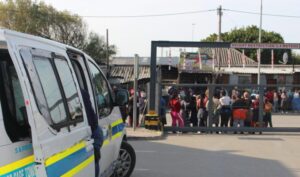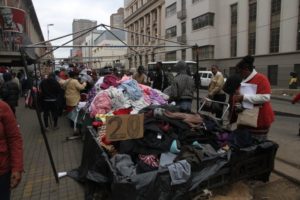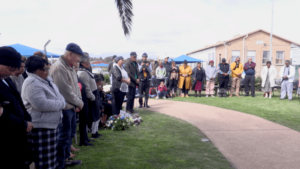Workers across the country highlighted the impact budget cuts are having on education. Thousands of Cosatu affiliates participated in a general strike to mark the International Day of Decent Work. Unemployment, rising cost of living, crime and austerity measures topped the focus of the action this Monday.
Last month, protests were held in different parts of Cape Town, to push back the Western Cape government’s announcement that the education department (WCED) would be cutting 2,407 teaching posts in 2025.
Teachers lament planned job cuts
Nonceba Nduna, a teacher at Voorbrug Senior Secondary School in Delft and a PEC member of Sadtu (South African Democratic Teachers Union) in the Western Cape lambasted the planned cutting of teaching posts. “I am deeply hurt by the plans to cut teaching jobs. I feel sorry for our education system, because if this continues then it means it is being destroyed. If you’re saying you’re planning to remove 2,407 teachers next year, then what is the reason for us to let parents register their kids? Who is going to teach them? It means the learners must stay at home. We know that schools also keep the learners safe from the ills of society. Parents need to know this clearly, that this is a plan to destroy the future of their kids,” said Nduna.
‘Why is austerity gunning
for only teachers?’
She said learners from poor communities were going to bear the brunt of the cutting of teaching posts. “Kids from affluent areas will not suffer, because their parents can manage to probably employ teachers for their home schooling. For us that cannot be possible. We feel like the government is starting a fight with us. Why do these austerity measures seem to only be gunning for teachers? Why don’t they apply them in parliament as well. They can start by cutting the number of ministers in the cabinet. This is painful, and what about the children? There are learners in university who are studying teaching – why are they studying if they will not be employed,” said Nduna.
She said this will contribute to poverty and more families will be going to sleep without food in their bellies. “This is a bread and butter issue. It can happen to any of us. We are here as teachers to show that we are crying and against this. We are meeting with WCED at our provincial level but there is nothing coming forth. We have heard they are planning to make other teachers permanent but they are still going on with the planned job cuts,” she added.
Pamela Ntanjana, who works as an administrator in a school in Emfuleni said the cutting of teaching jobs is a cause for serious concern. “Our biggest issue is quality education. Even now, in township schools there is not a single class with less than 45 learners in a room. In Grade 1, for example, which is the foundation phase, it’s impossible to teach a class of more than 45 kids. Now, imagine if you add on top of these numbers at the phase that is so critical. This means we are killing the education of the black person. In white people’s schools, you get 20 or 17 learners per class. Even if they cut teachers there, the impact is not so intense,” said Ntanjana.
She said they heard while outside the Western Cape provincial legislature that the MEC for Education David Maynier, doubled down and said teacher jobs will be cut whether unions like it or not.
In a statement it released last week, the Western Cape Education Crisis Committee said the planned job cuts come at a time where there is already a shortfall of at least 7,000 teachers in the Western Cape. “The result will be growing classroom sizes and even poorer learning outcomes. This comes only months after hundreds of people in the health sector signed a petition condemning the devastating impacts the national and provincial government’s budget cuts have on health care, whose budget has also been slashed substantially.”
The committee said more than 5% of the health budget has been cut in 2023 alone. “Already, there is a shortfall in health resources and healthcare workers, just like in education. The crises in education and healthcare have direct consequences for people’s lives. There will be longer waiting lines in clinics and further delays before people get treatment for chronic conditions like cancer, tuberculosis, HIV and Aids and mental health conditions,” their statement warns.





